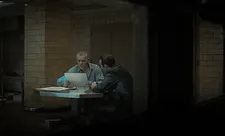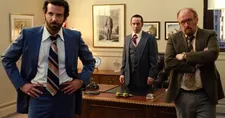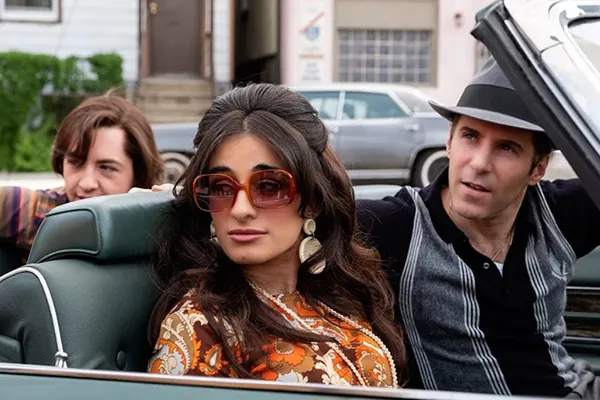 |
| Alessandro Nivola as Dickie Moltisanti with his father’s (Ray Liotta) wife Giuseppina (Michela De Rossi) and his nephew Tony Soprano (Michael Gandolfini) in The Many Saints Of Newark |
In the second instalment with Alessandro Nivola, star of Alan Taylor’s The Many Saints Of Newark (co-written by Lawrence Konner and David Chase, based on The Soprano characters created by Chase) we discuss how Chase and Taylor ended up deciding to have Ray Liotta play his own brother, the need for Dickie Moltisanti (Nivola) to unburden himself as Tony Soprano, played by James Gandolfini, had in The Sopranos series, Al Hirt versus Miles Davis, Alessandro’s longtime double Carl Paoli, the David O Russell technique, and why he wanted to be an actor since he was a kid.
 |
| 'Hollywood Dick' Moltisanti (Ray Liotta), Buddha (Joey Diaz), Junior Soprano (Corey Stoll), Pussy Bonpensiero (Samson Moeakiola), and Paulie Walnuts (Billy Magnussen) |
From New York City, Alessandro Nivola joined me on Zoom for an in-depth conversation on The Many Saints Of Newark and the David O Russell technique.
Anne-Katrin Titze: It’s such interesting casting that your uncle is also played by Ray Liotta. It’s twofold, on the one hand it’s like zombies or vampires, you can’t kill him, he’s back. He will always be there and get to you. And on the other hand it’s the split into the good father and the bad father, like a fairy tale that has one mother figure separated into the good mother and the evil stepmother.
Alessandro Nivola: It wasn’t written that it was the same actor. That was an idea that Alan Taylor and I guess David Chase had together. In fact initially they had two different actors in mind for those two parts. Ray was one of them.
One day Alan called me up and said, hey I was thinking about casting Ray as both roles and I just immediately begged him to do it, because it felt to me like in a way, having seen the show by this time, one of the elements that was most reminiscent of the series. It had a kind of surreal kind of gallows humour. Having him in that role allowed those things to float out of reality without us having to do anything as actors.
We were just playing the scenes completely for real, but because it’s the same actor your brain immediately starts asking all those questions. Is it really happening? Is this a figment of my imagination? Is it my conscience? He’s my kind of phantom consigliere, he’s my confessor, he’s the surrogate for Dr. Melfi, you know, the shrink.
Those scenes really are the mirror of the Melfi scenes in the Sopranos. And I do, just as Gandolfini did - I come to this person because I have some need to unburden myself and to tell the truth, and all I do is lie. Which is just what he did to his shrink. Yeah, that was a great idea to have Ray playing both of those roles. He did it so well because he was so different in the two parts. I love him particularly as the uncle.
AKT: A scene you have with him is my favourite in the movie. You tell him “I do all these good things!” And his response is “Maybe some of the things you chose to do aren’t God’s favourite.” Your reaction after that, your face, that’s my favourite moment in the film. It’s as if you, Alessandro, are asking “Am I God’s favourite or not?”
AN: That’s so great. Yeah, that was maybe the last scene we shot in maybe the whole movie.
AKT: Really?
AN: I think so. The way that he got this character longing to make his mark in some kind of heroic noble way and then just keeps upending himself over and over again is just great, the way he rendered that. I always imagined that he was kind of baffled by his own violence, like he could not understand why he kept destroying everything he loved the most. He’s just totally confused and can’t understand how to process that.
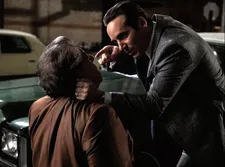 |
| Dickie Moltisanti (Alessandro Nivola) goes off on Buddha (Joey Diaz): “The thing about explosive violence is that it almost forces you out of your plan.” |
AKT: What other records are you bringing, besides the Miles Davis? You’re bringing the uncle something that is clearly not jazz.
AN: The other thing about the character is that he’s clearly not that bright, he’s a little bit stupid in ways that are kind of funny at times, particularly in the scenes with Ray. He’s so eager to please Ray because his character is so unforthcoming. He keeps his cards so close to his chest and Dickie keeps coming there kind of trying to get on his good side and he brings some album, it’s Al Hirt, which I guess, David thought was a kind of cheesy jazz musician compared to Miles who at that time was obviously more avant-garde and cutting edge and Al Hirt was a kind of populist entertainer. I guess Dickie keeps seeing him play on Johnny Carson. He brings it to Ray and Ray is just totally disgusted by it, wants to have nothing to do with it and gives it back.
AKT: The scene on the beach and in the water - to speak in code again - how was filming that? Where did you shoot that? Was it you or a stunt double?
AN: It was pretty much me. There’s this great guy Carl Paoli, who has doubled me on like seven movies now over the years. I’ve posted a picture on Instagram of the two of us together in costume where we look just like identical. It’s kind of upsetting. He’s just a wonderful guy and ever since my very first movie, John Hughes’ Reach the Rock [directed by Bill Ryan], many years ago, and he doubled me there.
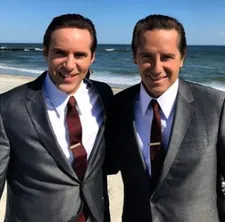 |
| Alessandro Nivola with longterm stunt double Carl Paoli: “I’ve posted a picture on Instagram of the two of us together in costume where we look just like identical.” Photo: Alessandro Nivola |
In [John Woo’s] Face/Off and in Jurassic Park III [directed by Joe Johnston], there’s a long long list of movies that we’ve done together and he doubled me on this. He did a little bit in that scene, but it was pretty much mainly me. That was a kind of climactic scene in the movie. We filmed it in the Rockaways, I think. It’s a scene that is set up to be so romantic and it takes such a dramatic turn.
AKT: Yes, at first, going to the beach, I had to think about Once Upon a Time in America, when Robert De Niro is taking her [Elizabeth McGovern] to this seaside place and we think, oh, is it going that way? And then it goes some other way.
AN: Yeah exactly. He wanted it to be sort of the sweetest that it had ever been between us in the whole film.
AKT: There are so many moments of aggression. Is there at all for you as an actor any kind of catharsis? It can be for the audience. When you are performing acts of aggression, is it mostly your art, your craft you are thinking about or can it be emotionally cathartic?
AN: Well, it’s emotionally cathartic anytime you do a scene where you feel like you lose yourself, your awareness of yourself. That’s really the drug of it, at least for me. That’s why I wanted to be an actor since I was a little kid, was the feeling of losing that awareness of myself and everything that comes with that.
The relief that you feel in those moments and shortly after is really a beautiful thing. And you keep needing to try and feel that way again and again, as much as you can. And you don’t always if the scene isn’t playing right. If you haven’t connected with the character in the right way or the person. It’s not so much whether it’s a violent act or some other kind of tone or sentiment. It doesn’t really matter as much as the feeling athletes describe as well as “being in the zone.”
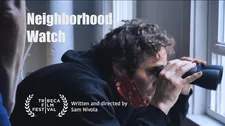 |
| Alessandro Nivola, Emily Mortimer, May Nivola, and Sam Nivola star in Sam’s Neighborhood Watch at the 2021 Tribeca Film Festival |
AKT: The magic kicks in or not.
AN: If you have that feeling where you’re not aware of what you’re doing anymore and things happen that are unplanned. It’s a euphoric feeling. The thing about explosive violence is that it almost forces you out of your plan. These things have to be controlled and you can’t just start thrashing around and hurting people. But because they’re explosive, they can force you out of your self-awareness that way.
Anytime there’s something with extreme emotion, the only way to have it work is to kind of what you, what we, were talking about at the beginning of this conversation. It’s the letting go of control. That feeling can be just so rewarding and certainly like with David O. Russell’s way of filming, it’s so that you can’t do it without. You can’t plan anything about it, except your behaviour and what you know of your character and the way that you speak and the way that you move.
Those things have to become very much a part of you and then what happens on the day you can’t plan. Because a lot of the time he’s actually telling you what to say while the camera’s rolling. You just have to abandon yourself to that. It’s definitely frightening, but it’s a great feeling if you can do that. With the violence it’s not so much that I get something out by yelling at somebody, it’s more just the feeling of not having to live with myself for a little while.
AKT: I get it. One more question - have you ever been in a coffin before?
AN: That’s a good question! I feel like I have, but maybe I just dreamt it. Have I died in another movie? I died in Face/Off but I wasn’t in a coffin.
AKT: How did it feel?
AN: To be in a coffin? It’s weird, you have to sort of hold your breath for the camera so your chest isn’t heaving up and down. But that again was such a great surreal moment, very Sopranos-esque.
AKT: Everybody knows you’re dead at the beginning of the Sopranos, so we are not giving anything away.
AN: No, that was a foregone conclusion. Everybody just wanted to know how.
AKT: And we are not giving that away!
Read what Alessandro Nivola had to say on his character Dickie Moltisanti, the influence of Gay Talese, and his many upcoming projects.








